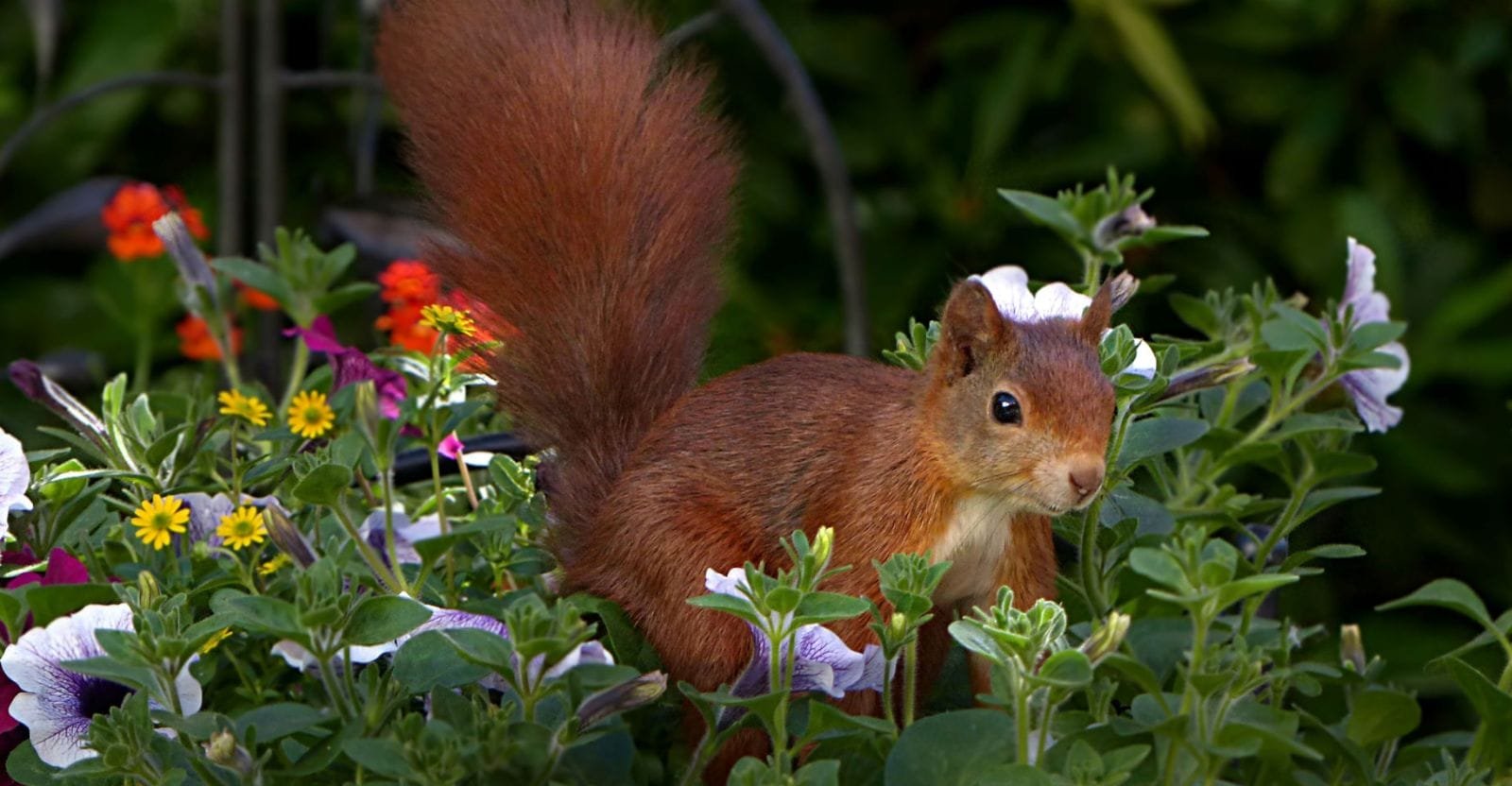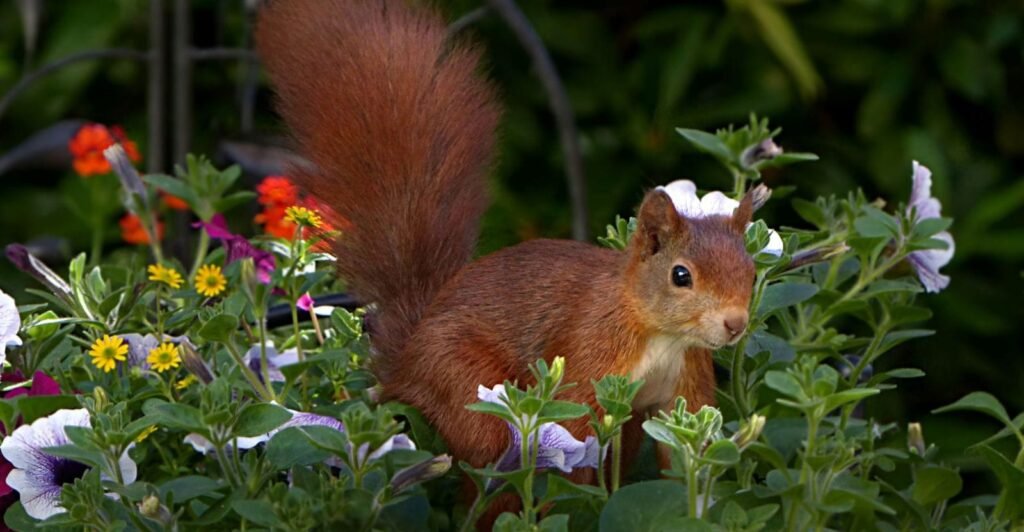
How to Keep Squirrels Away
Squirrels are cute, intelligent, and curious creatures, but they can quickly become a hassle when they invade your garden or home. These mischievous little animals have an unrelenting love for fruits, vegetables, nuts, and seeds, and once they find their way in, it can be hard to get rid of them. Whether you’re dealing with them digging up your garden, nibbling on your trees, or invading your attic, keeping squirrels away can feel like a never-ending task.
Here’s your ultimate guide on how to keep squirrels away from your home and garden, with some simple tips to help you deal with these furry invaders.
Why Worry About Squirrels in the Garden?
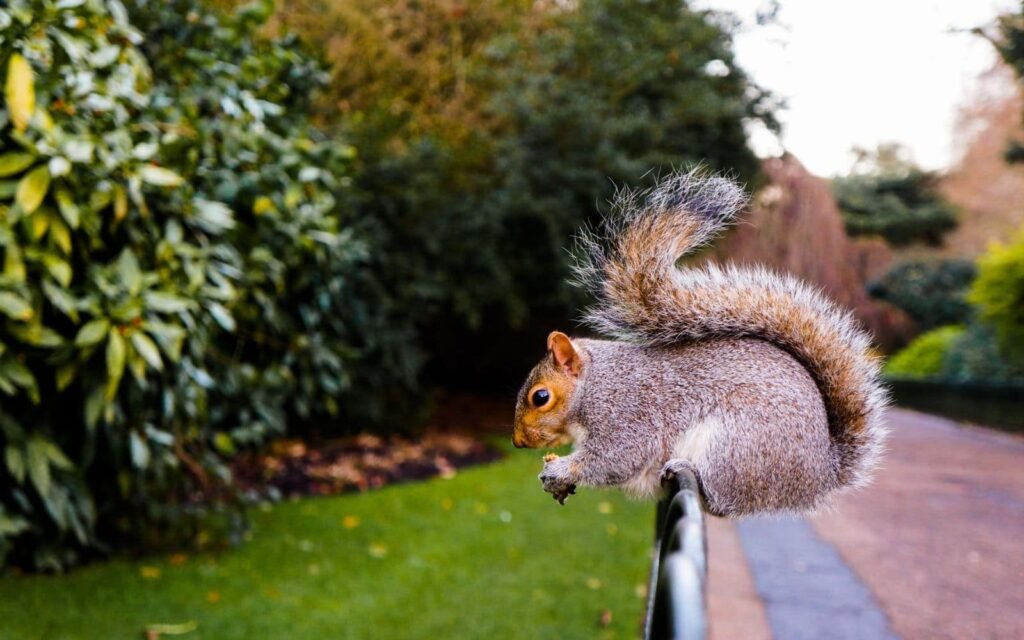
Squirrels are undeniably cute, but they can wreak havoc in your garden and around your home. They’re on the constant hunt for food, with their favorite targets being bird seeds, fruits, vegetables, and even pet food. They’re active year-round, except during the coldest spells when they lie low, and they’re notorious for hoarding food in the fall.
Here are some reasons why you should keep squirrels at bay:
- Garden Damage: Squirrels often dig in garden beds and soil, uprooting plants and burying nuts, causing destruction to your bulbs, seeds, and plants.
- Chewing on Trees: They love to chew on the soft bark of young trees, which can stress the plant and stunt its growth.
- Damage to Structures: Squirrels can chew on various materials around your house, including wires, furniture, and even your patio or deck.
- Nesting in Your Home: Squirrels might try to make a nest in your attic or under your roof, leading to additional cleanup and safety concerns.
- Health Risks: Like other rodents, squirrels carry bacteria and diseases that can be harmful to both pets and humans.
What Attracts Squirrels?
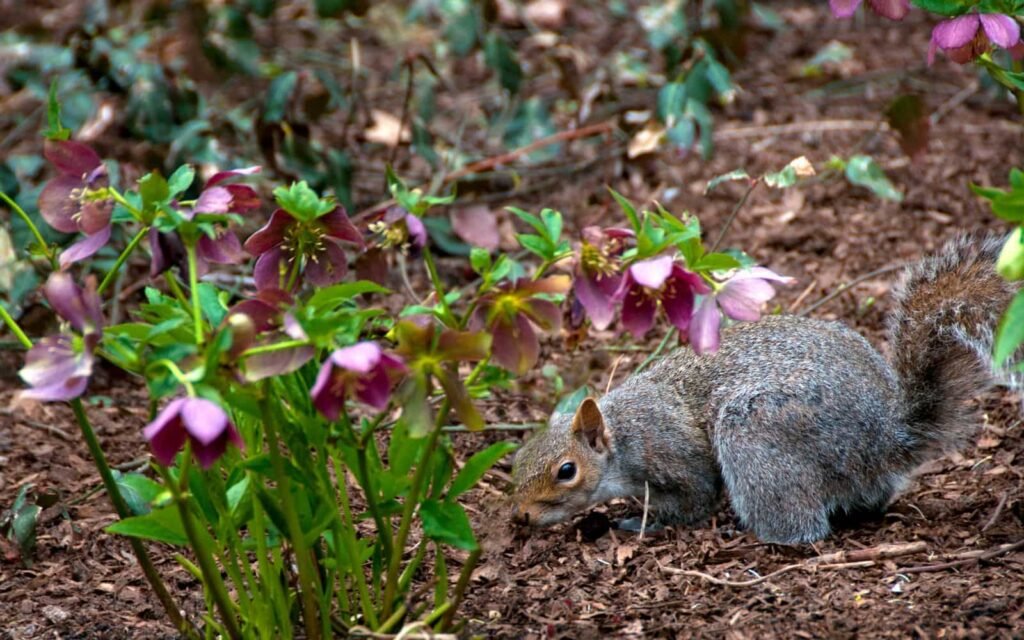
Squirrels are curious and always looking for food. They’re drawn to areas where they can find acorns, berries, bulbs, nuts, and birdseed. In addition to food, they also use gardens as places to nest and play, especially if they feel safe and can find easy access to shelter.
- Food Sources: Fallen fruits, nuts, and acorns in your garden can attract them.
- Bird Feeders: Squirrels love stealing food meant for birds.
- Nesting: Squirrels are territorial, and if they find a safe, hidden spot in your garden or attic, they may decide to settle down.
Their ever-growing teeth mean they’ll chew on anything to keep them filed down, including electrical wires, tree bark, and even wooden furniture.
How to Identify Squirrel Damage in Your Garden
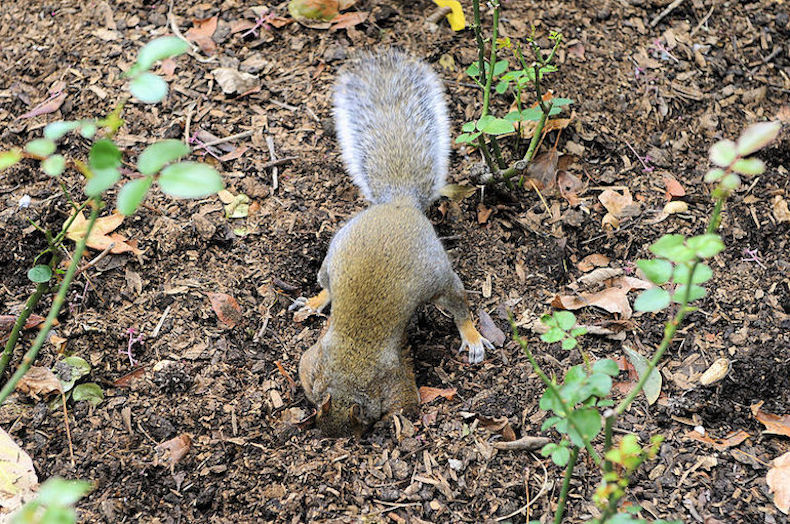
If you suspect squirrels are causing trouble in your garden, it’s important to identify the signs of damage:
- Shallow Holes: Look for small, shallow holes around your plants, fruits, and vegetables. These could be signs that squirrels are digging for insects or hiding food.
- Chewed-up Plants: Squirrels will nibble on growing plants, especially bulbs. If you find half-eaten fruits or plants with bite marks, it’s likely squirrels are to blame.
- Missing Bulbs or Seeds: Squirrels love to dig up and eat bulbs or store nuts in the soil, often ruining your garden’s new growth.
- Chewed Trees: If you have mature trees, you may see signs of chewing, particularly on the bark of younger saplings.
How to Get Rid of Squirrels from Your Garden and Home
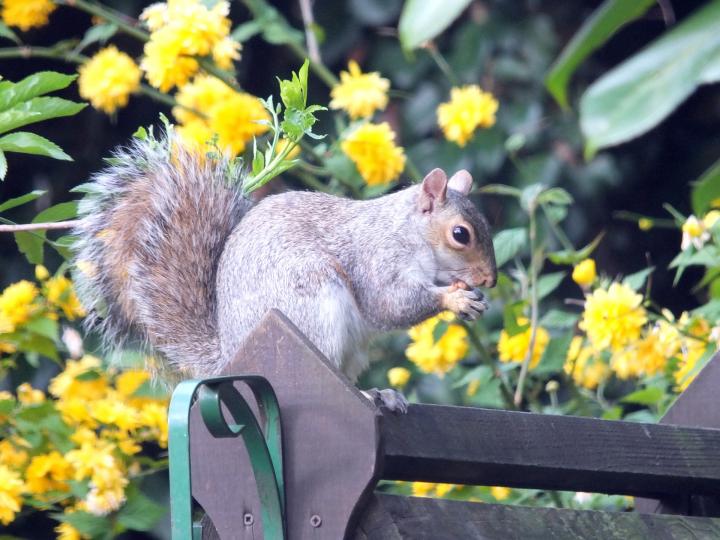
Now that you know why squirrels are invading, let’s dive into how to keep them away from your garden and home. Here are 15 strategies to help you deal with squirrels:
- Grow Squirrel-Repelling Plants
Squirrels dislike certain plants. By growing them near your garden, you can deter squirrels. Some good options include marigolds, mustard, peppermint, and daffodils. These plants have strong aromas that squirrels tend to avoid. - Remove Food and Water Sources
If there’s food and water easily accessible, squirrels will keep coming back. Clean up fallen fruits, nuts, and acorns from your garden, and make sure bird feeders are squirrel-proof. - Trap and Relocate
Use humane traps to catch and relocate squirrels. There are various traps available, such as the Rugged Ranch Squirrelinator, which can catch multiple squirrels at once. Be sure to check your local laws regarding trapping and relocation. - Build Fences and Barriers
A physical barrier can be very effective. You can place metal tree collars around tree trunks to prevent squirrels from climbing. For garden beds, use netting or chicken wire to keep them from digging or nibbling on plants. - Use Mulch or Gravel
Spread mulch or install gravel around your garden to make it harder for squirrels to dig. You can also use chicken wire under the mulch to further protect your plants. - Motion-Activated Sprinklers
A motion-activated sprinkler can be a fun and effective way to scare squirrels away. When triggered, the sprinkler sprays water, surprising the squirrel and sending it running. - Use Cayenne Pepper or Peppermint Oil
Squirrels have sensitive noses, so try sprinkling cayenne pepper or using peppermint essential oil around your garden. These scents are overwhelming to them and will keep them at bay. Be sure to use it around your plants, as it won’t harm them. - Commercial Repellents
If homemade remedies aren’t cutting it, try commercial squirrel repellents. Products like Bobbex can help keep squirrels and other rodents away from your yard. - Apple Cider Vinegar Spray
Mix apple cider vinegar with a bit of soap in a spray bottle and apply it to hard surfaces like gates, driveways, or patios. The strong smell will deter squirrels from entering your garden. - Use Pets to Scare Them
If you have a dog or cat, let them roam around the yard. Their presence alone can be enough to scare squirrels away, as these pets are natural predators. - Trim Overhanging Tree Branches
Trim any tree branches that hang near your roof or attic. This will prevent squirrels from accessing your roof and possibly getting into your attic. - Remove Squirrel Nests
If you spot a squirrel nest in your trees or garden, remove it as soon as possible. Squirrels can reproduce quickly, and you don’t want to end up with an even bigger problem later. - Use Mothballs
Mothballs emit a strong odor that squirrels find unpleasant. Place them in areas where squirrels are active, but be sure to keep them away from pets and children, as they can be toxic if ingested. - Spray Predator Urine
Squirrels tend to avoid areas where predators, like foxes or coyotes, roam. You can purchase predator urine (fox or coyote) and spray it around your yard to make squirrels feel threatened and stay away. - Lure Them Away
If you’re looking for a more peaceful solution, set up a squirrel feeder stocked with food they love, like peanuts, corn cobs, and sunflower seeds. Place the feeder away from your garden to keep them distracted.
Can You Kill Squirrels in Your Yard?
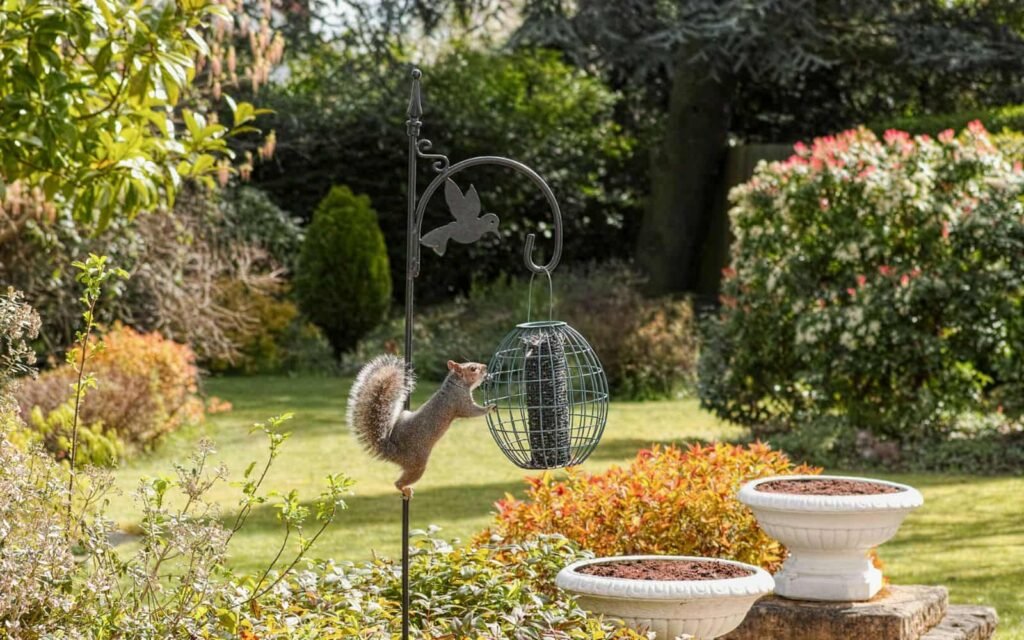
Laws vary depending on where you live, so check your local regulations before taking any action. In many places, trapping and relocating squirrels is the legal and humane way to handle them. Some areas allow for hunting, but using pellet guns or poison is generally not recommended due to the risk of harm to other animals and pets.
If you have an extreme infestation, it’s best to contact a professional pest control service to remove the squirrels safely.
By following these strategies, you can successfully keep squirrels away from your home and garden. Whether you’re looking for natural deterrents or physical barriers, there are plenty of options available to protect your space from these clever little creatures.
FAQs for Keeping Squirrels Away from Your Home and Garden
1. What are some natural deterrents to keep squirrels away?
Squirrels dislike strong scents, so natural deterrents include:
- Cayenne pepper: Sprinkle cayenne pepper around plants or garden areas. The strong scent will deter squirrels.
- Garlic or peppermint oil: Squirrels dislike garlic and peppermint. You can make a homemade spray by mixing these ingredients with water and spraying them around your garden.
- Vinegar: Squirrels are sensitive to the smell of vinegar. Spraying it around the perimeter of your garden can help keep them away.
2. How can I keep squirrels out of my garden?
To protect your garden, consider the following strategies:
- Fencing: Install a tall, sturdy fence with small openings (less than 1 inch) to prevent squirrels from getting through. Ensure the fence is buried a few inches into the ground to prevent burrowing.
- Garden netting: Use mesh or garden netting around your plants, especially vegetables or fruit trees, to prevent squirrels from accessing them.
- Raised garden beds: Building raised beds with barriers or mesh coverings can help keep squirrels from reaching your plants.
3. Are there any physical barriers I can use to prevent squirrels from accessing my attic or home?
Yes! You can use these physical barriers to keep squirrels out:
- Seal entry points: Inspect your home for any small holes or gaps around windows, vents, and eaves, and seal them with steel mesh or caulking.
- Squirrel-proof bird feeders: Use squirrel-proof bird feeders that are designed to block squirrels while allowing birds to feed.
- Chimney caps: Install chimney caps to prevent squirrels from entering your home through the chimney.
4. Will hanging shiny objects keep squirrels away?
Squirrels are sensitive to bright, reflective surfaces. Hanging objects such as aluminum foil strips, mirrors, or shiny reflective tape can help deter squirrels by disorienting them. You can also use old CD discs or reflective garden stakes for this purpose.
5. Do ultrasonic devices work to keep squirrels away?
Ultrasonic devices that emit high-frequency sounds may deter squirrels, as they find these noises unpleasant. However, their effectiveness can vary, and some squirrels may become accustomed to the sound over time. It’s best to use them in combination with other methods for better results.
6. How do I prevent squirrels from eating my fruit or vegetables?
To protect your produce from squirrels, consider the following:
- Cage your plants: Install mesh or chicken wire around fruit trees or vegetable plants to physically prevent squirrels from reaching them.
- Plant deterrent crops: Certain plants, like marigolds or daffodils, can help deter squirrels naturally.
- Use squirrel repellents: Apply commercial squirrel repellents around the garden and on plants to make them less attractive.
7. Can I use traps to catch squirrels?
Yes, live traps can be used to capture squirrels. Once trapped, release them far from your home, preferably in wooded areas. Make sure to check local regulations regarding trapping and relocating squirrels, as some areas may have specific laws for this.
8. What kind of food can attract squirrels to my garden?
Squirrels are attracted to food sources such as:
- Nuts: Squirrels love nuts, especially acorns, hazelnuts, and walnuts. If you have nut trees or store nuts in your garden, they might be drawn to the area.
- Birdseed: If you have bird feeders, squirrels may be attracted to the seeds, especially sunflower seeds or peanuts.
- Fruit and vegetables: Sweet fruits and tender vegetables like tomatoes, corn, and berries are also favorites for squirrels.
9. Are there any plants I can grow to repel squirrels?
Yes, certain plants can act as natural repellents to keep squirrels at bay. These include:
- Alliums: Onions, garlic, and chives have a strong smell that squirrels avoid.
- Mint: Squirrels dislike mint, so planting mint around the garden may help keep them away.
- Daffodils: The scent of daffodils is unpleasant to squirrels, so planting them can help deter them.
10. Will squirrels dig up my bulbs? How can I stop them?
Squirrels love to dig up bulbs, especially in fall and spring. To protect your bulbs:
- Mesh or wire cages: Plant bulbs inside wire or mesh cages that will allow the plant to grow but keep squirrels out.
- Repellents: Use squirrel repellents or sprinkle cayenne pepper around bulbs to discourage digging.
- Cover bulbs with chicken wire: Lay chicken wire over the planting area to prevent squirrels from digging into the soil.
Conclusion
Squirrels can be tricky little creatures to keep out of your garden and home, but with a combination of natural deterrents, physical barriers, and mindful care, you can successfully protect your space. Whether you prefer to use scents, traps, or barriers, there are plenty of effective strategies to discourage squirrels from causing damage. Stay proactive, and you can enjoy a squirrel-free garden and home!

